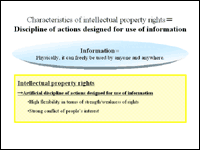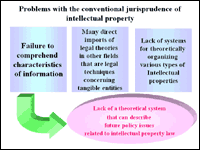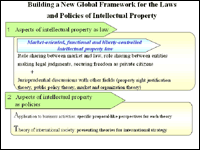|
The COE program will be carried out by people who majored in jurisprudence and political science at the Hokkaido University Graduate School of Law, Creative Research Initiatives “Sousei,” as well as the Center for Advanced Science and Technology. This program is referred to as the Laws and Policies of Intellectual Property: Building a New Global Network.
[note 1]The objectives for building this framework are two-fold. The first objective is to establish a new framework for the laws and policies of intellectual property, and the second objective is to train world-class next-generation researchers on intellectual property and international-standard legal practitioners who can be active at the cutting edge of intellectual property business activities.
As epitomized by the phrase “re-building up Japan by intellectual property rights,” much attention has been directed toward intellectual property. However the future of intellectual property is in a state of confusion.
Unlike actual property rights for tangible assets, intellectual property rights are intended for information. From a physical standpoint, information property can be freely used by anyone and anywhere. The concept of intellectual property aims to artificially or forcibly establish exclusive rights to information, which has the aforementioned characteristics.Therefore, these rights can be made exclusive to one person or for many people at once. In this regard, design for institutions can be highly flexible. On the other hand, these rights tend to infringe upon people’s freedoms and, if left unattended, they can easily be violated. Therefore, the interests of people are deeply involved. [note 1]
Nevertheless, in the conventional Japanese jurisprudence of intellectual property law, no systems have been established to give concrete shape to policy arguments by understanding the characteristics of information, which are covered by intellectual property law, and by theoretically organizing various types of intellectual properties. Although there are many direct imports of legal techniques for tangible assets, lack of a theoretical system that can describe resolved in Japan jurisprudence. [note 2]
Now, what are the laws and policies of intellectual property in our new framework?
First of all, we will consider the concept of market-oriented, functional and liberty-controlled intellectual property law as one of the bases, which I have ---. This concept aims to systematize intellectual property law and propose policies while paying close attention to the three viewpoints. The first of which is role sharing between market and law. The second is role sharing between entities making legal judgments. And the third is securing freedom as private citizens. In this COE program, those three viewpoint are regarded as the main pillars while jurisprudential discussions with other fields are held and theories are academically developed by combining property right justification theories, public policy theories, such as those of fundamental human rights, as well as market and organization theories in order to create the new jurisprudence of intellectual property that takes information characteristics into consideration.
Second, the jurisprudence of intellectual property that has thus been established will be systematically developed into policy studies for addressing practical issues. [note 3]
In addition, a new framework that aims to elucidate the international strategy of intellectual property law will be established.
|

note1

note2

note3
|